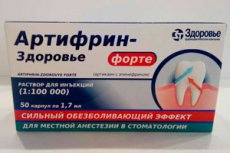Artifrin
最近審查:04.07.2025

“Artifrin”是一种复合局部麻醉剂,含有两种活性成分:盐酸阿替卡因和肾上腺素。
- 盐酸阿替卡因:是一种强效局部麻醉剂,用于在医疗或手术前麻醉身体特定部位的组织。它能阻断神经冲动的传递,并暂时抑制麻醉区域的感觉。
- 肾上腺素:肾上腺素作为血管收缩剂添加到药物中,这意味着它可以使血管变窄。这有助于减少用药部位的出血,并通过减少阿替卡因的吸收和增加麻醉持续时间来延长其作用时间。
“Artifrin”常用于牙科,为拔牙或根管治疗等牙科手术提供局部麻醉。它也可能用于其他医疗领域,提供局部麻醉。
值得注意的是,由于可能出现严重的副作用,如过敏反应、可能的心脏问题和高血压,Artifrin 只能在合格的医疗保健专业人员的监督下使用。
適應症 Artifrina
牙科手术:牙医经常使用 Artifrin 为各种牙科手术提供局部麻醉,例如:
- 拔牙。
- 根管治疗。
- 治疗牙周炎(牙齿周围组织发炎)。
- 牙科修复和植入。
小手术:在某些情况下,Artifrin 可用作小手术的局部麻醉剂,例如去除小皮肤生长物。
医疗程序:在许多医疗领域,Artifrin 可用作需要麻醉身体小区域的其他程序的局部麻醉剂。
發布表單
“阿替林”通常以注射剂形式供应。该溶液含有两种活性成分:盐酸阿替卡因和肾上腺素。“阿替林”通常以安瓿瓶或小瓶形式供应,容量为几毫升至几十毫升。
藥效學
- 盐酸阿替卡因:是一种酰胺类局部麻醉药。其作用机制为阻断神经冲动沿神经纤维的传导,导致局部麻醉区域暂时失去敏感性。
- 肾上腺素:肾上腺素作为血管收缩剂添加到药物中。这意味着它会收缩用药区域的血管。这有助于减少用药区域的出血,并通过减缓阿替卡因的吸收来延长其作用时间。
藥代動力學
- 盐酸阿替卡因:阿替卡因经局部给药组织吸收,并在肝脏中快速代谢为无活性的代谢物。阿替卡因通常在注射后数分钟起效。
- 肾上腺素:局部注射的肾上腺素也能迅速被组织吸收,并在给药区域发挥其血管收缩作用。因此,阿替卡因的作用时间得以延长,从而延长麻醉时间。
这两种成分共同构成复合物,可有效缓解疼痛,并降低应用区域出血的风险。通常情况下,“Artifrin”的药效持续时间为数小时。
劑量和管理
- 剂量:Artifrin 通常以注射的方式注射到需要麻醉的局部区域,具体方法请遵照牙医或医生的指示。剂量可能因手术类型、复杂程度以及患者的个人需求而异。
- 注射次数:注射次数也可能因需要麻醉的区域的大小和手术的类型而异。
- 使用频率:“Artifrin”通常在手术开始前立即使用,并且可以在手术过程中根据需要重复使用。
- 最大剂量:Artifrin 的最大剂量是考虑到阿替卡因和肾上腺素的最大安全剂量,并考虑到可能的副作用和风险而确定的。
在懷孕期間使用 Artifrina
孕期应谨慎使用阿替林(盐酸阿替卡因,肾上腺素),并务必遵医嘱。孕妇在使用阿替林前,应与医生讨论其潜在风险和益处。
需要注意的是,虽然局部麻醉药(例如阿替卡因)在局部使用时通常不会对身体产生全身影响,但阿替林中的血管收缩剂肾上腺素可能会产生全身影响,包括对心血管系统的影响。因此,在怀孕期间应限制使用阿替林,仅在必要时使用。
医生必须权衡Artifrin对母亲的益处与对胎儿的潜在风险,并根据每个临床病例的具体情况做出决定。如果必须使用Artifrin,通常建议使用最低有效剂量和最低剂量的肾上腺素。
禁忌
- 过敏症:Artifrin 的任何成分,包括盐酸阿替卡因、肾上腺素或任何其他成分,均可能引起对其过敏者出现过敏反应。因此,已知对利多卡因、阿替卡因或其他酰胺类麻醉药过敏的患者应谨慎使用该药物。
- 心动过速和心律失常:阿替林含有肾上腺素,可能导致心脏活动增加。因此,严重心律失常、心动过速或其他心血管疾病患者应避免使用。
- 高血压危象:肾上腺素会增加血压和心脏功能,这对高血压危象或高血压患者来说可能是危险的。
- 甲状腺毒症:肾上腺素可能会加重甲状腺毒症的症状,因此患有这种疾病的患者应谨慎使用。
- 嗜铬细胞瘤患者:由于嗜铬细胞瘤患者对儿茶酚胺的敏感性增加,肾上腺素可能会引起嗜铬细胞瘤患者的严重反应。
副作用 Artifrina
- 过敏反应:与其他含有麻醉剂和肾上腺素的药物一样,Artifrin 会导致某些患者出现过敏反应,包括过敏性休克。
- 心血管影响:阿替林的成分之一肾上腺素可能会导致心率加快、血压升高和心律失常。部分患者可能会出现心悸、心律失常或心肌缺血加重。
- 心血管并发症:使用肾上腺素可能会导致严重的心血管并发症,如心肌梗塞或中风,尤其是在患有心血管疾病的患者中。
- 高血压:肾上腺素可能导致血压升高,从而导致高血压和高血压危象。
- 局部反应:Artifrin注射部位可能会出现各种局部反应,如疼痛、肿胀、出血或皮肤颜色变化。
- 神经系统症状:部分患者可能会出现头晕、头痛、震颤或感觉异常等神经系统症状。
- 其他罕见反应:可能出现其他罕见副作用,包括注射部位反应、心动过缓、意识丧失和其他严重反应。
過量
- 心律失常:心率加快、心律不齐或其他心律失常。
- 高血压:高血压,会导致头痛、头晕,甚至更严重的并发症。
- 心动过速:心率增加会引起脉动、心悸和焦虑的感觉。
- 震颤和颤抖:神经兴奋会引起身体各个部位的震颤和颤抖。
- 头晕和头痛:心率增加和血压变化会导致头晕和头痛。
與其他藥物的相互作用
- 麻醉剂:将 Artifrin 与其他麻醉剂一起使用可能会增加出现不良副作用的风险,包括对心血管系统的毒性作用。
- 影响心血管系统的药物:肾上腺素是 Artifrin 的一部分,它可能会增强其他影响心血管系统的药物的作用,例如β受体阻滞剂或升高血压药物。
- 升高血压药物:将 Artifrin 与升高血压药物(如拟交感神经药或单胺氧化酶抑制剂)一起使用可能会导致血压显著升高,并可能引起严重的并发症。
- 降血压药物:将“Artifrin”与降血压药物一起使用可能会导致麻醉效果降低,并增加其全身影响。
- 影响肝功能的药物:将“Artifrin”与在肝脏中代谢的药物一起使用可能会影响其代谢并增加毒性作用的风险。
注意!
為了簡化對信息的理解,本指令使用了藥物 "Artifrin",並根據藥物的醫療用途官方說明。 使用前請閱讀直接用於藥物的註釋。
描述僅供參考,不適用於自我修復指導。 這種藥物的需求,治療方案的目的,藥物的方法和劑量僅由主治醫師確定。 自我藥療對你的健康有危害。

